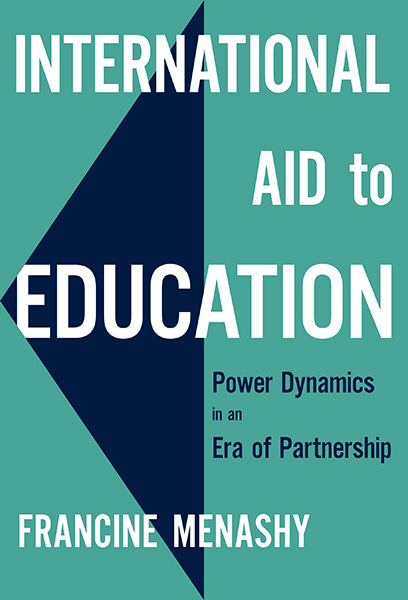Professors: Request an Exam Copy
Print copies available for US orders only. For orders outside the US, see our international distributors.
Foreword by: Steven Klees
Publication Date: July 12, 2019
Pages: 160
Series: International Perspectives on Educational Reform Series

Partnerships are now pervasive in global education and development, but are they creating equitable, cooperative, and positive relationships? Through case studies of prominent multistakeholder partnerships—including the Education Cannot Wait Fund and Global Partnership for Education—as well as a comprehensive analysis of the global education network, this book exposes clear power imbalances that persist in the international aid environment. The author reveals how actors and organizations from high-income countries continue to wield disproportionate influence, while the private sector holds a growing degree of authority in public policy circles. In light of such evidence, this book questions if partnerships truly ameliorate power asymmetries, or if they instead reproduce the precise inequities they are meant to eliminate.
Book Features:
Francine Menashy is an associate professor in the Department of Leadership in Education and teaches in the Urban Education, Leadership, and Policy Studies doctoral program at the University of Massachusetts Boston. Dr. Menashy is coeditor of Comparative Education Review.
“An essential reference for scholars and practitioners interested in taking a critical look at the evolution of the aid architecture, particularly in the education sector, and in better understanding persisting and emerging challenges.”
—International Review of Education
"The use of partnerships for international aid and development has become ubiquitous, and their value has been too-little questioned. For education, Francine Menashy’s book remedies this with a detailed, probing analysis of such partnerships in theory and practice."
—From the foreword by Steven J. Klees, University of Maryland
“International Aid to Education is an urgent read for anyone working in international development. Menashy problematizes the embrace of partnerships, constructively examining the content and nature of collaborations in educational development and aid. Her work points to ways in which all of us working in research, policy, and practice can rethink our own roles in perpetuating power imbalances and inequities.”
—Sarah Dryden-Peterson, Harvard Graduate School of Education
“Francine Menashy's new book provides a fresh and innovative take on power and politics within multistakeholder partnerships in international development. Focusing on two recent partnerships that aim to support education in some of the world's most difficult contexts—the Global Partnership for Education and Education Cannot Wait—this book explores the uneasy evolution of power dynamics between private authority and official actors in international aid. It makes a strong new contribution to the study of global governance and education policy.”
—Karen Mundy, chief technical officer, Global Partnership for Education
Contents
Foreword Steven Klees ix
Acknowledgments xiii
List of Abbreviations xv
1. Introduction: Conceptualizing Power in an Era of Partnerships 1
Understanding Partnership 3
Understanding Power 6
Methods and Data Collected 10
Notes on Terminology 14
Rationale for This Book 16
A Note on Scope 18
My Position as Author 19
Overview of the Book 20
2. The Shift to Partnership in International Development and Education 23
The Era of Partnership 24
Multistakeholder Partnerships 29
Partnerships as Public–Private Arrangements 31
Questioning Partnerships 34
Partnerships in Education and Development 39
Conclusion 43
3. New Actors and Relationships in Aid to Education: Understanding Power in a Transnational, Partnership-Based Network 44
The Changing “Architecture” of Development Aid 44
Understanding Power in Networks 47
Network Research on International Development and Aid 50
Networks, Partnerships, and Aid to Education 51
Conclusion 58
4. Power Dynamics in a Multistakeholder Fund: The Case of the Global Partnership for Education 61
The History and Mandate of the Global Partnership for Education 61
Power Dynamics in the Global Partnership for Education 64
The Empowering of Private Actors in the Global Partnership for Education 71
Conclusion 80
5. The Challenges of Partnering for Aid to Education in Emergencies: The Case of the Education Cannot Wait Fund 81
The History and Mandate of the Education Cannot Wait Fund 82
Power Dynamics in Education Cannot Wait 85
The Empowering of Private Actors in Education Cannot Wait 95
Conclusion 100
6. Conclusion: Reconceptualizing Partnerships in International Aid to Education 102
Structural Power in Partnerships: North/South Hierarchies 102
Productive Power in Partnerships: The Framing of the Private Sector 105
Shifting Power Dynamics in Partnerships 107
Reconceptualizing Partnerships 111
Conclusion 117
References 119
Index 133
About the Author 141
Professors: Request an Exam Copy
Print copies available for US orders only. For orders outside the US, see our international distributors.